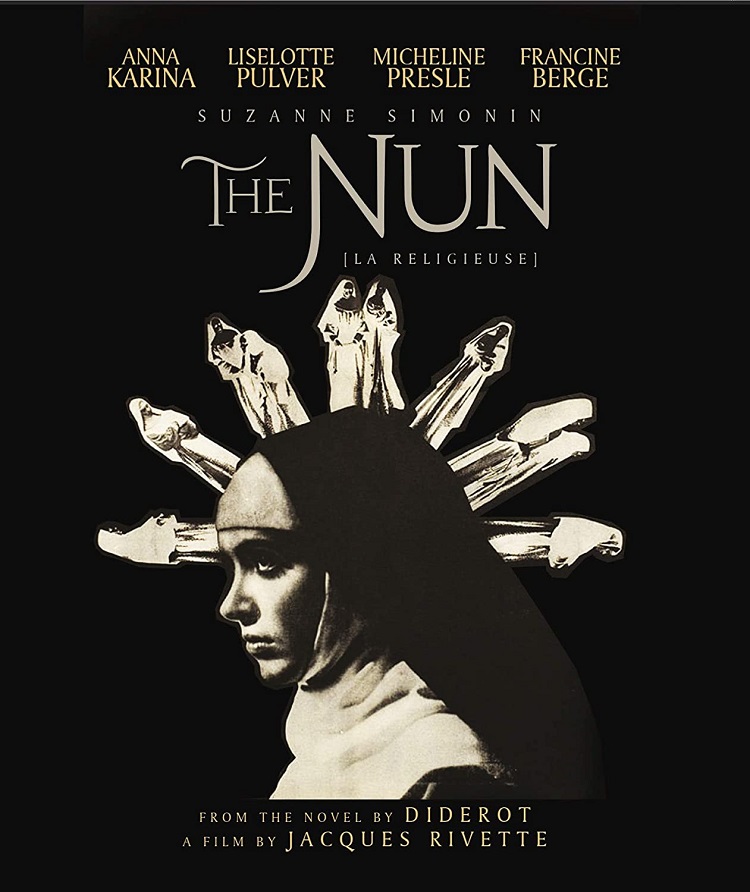
Jacques Rivette’s 1965 adaptation of the Denis Diderot book The Nun (La Religieuse) was controversial before it was even released. The script went through several adaptations in order to gain approval for production. Even then, they had to add in a title card noting that the film is fictional and does not paint a true picture of religious institutions (which is then quickly undermined in true Rivette fashion with a short intro about how Diderot’s book was based on historical fact). Once made and approved by the censorship boards, it faced outraged protests and delays in release. Much like Martin Scorsese’s The Last Temptation of Christ, people seemed to be offended by the very idea of the film. Finally, it was allowed to be shown at the Cannes Film Festival where it was greeted with much acclaim.
It stars Anna Karina, showing none of her usual exuberant 1960s chic, being dressed head to toe in dowdy religious attire as Suzanne Simonin, a young woman who has been forced to live as a novice at a nunnery. We first see her at a ceremony where she is supposed to take her vows and become a proper nun. Rivette films her at a distance from behind bars giving it the look and feel of a prison scene. Suzanne begins her vows properly but when asked to live a life of poverty, silence, and chastity, she screams like a caged animal and refuses. Later, her mother tells her that she is a child of an extra-marital affair and her mere existence causes the family shame. Besides, her sister’s marriages were costly but she’s saved some money while Suzanne has been a novice and she now has enough of a dowry for her to enter the convent proper. Filled with shame, she takes her vows.
Immediately, the other nuns gossip about her, shun her, and shame her. Except for the kindly Mother Superior who treats her with kindness. Naturally, she dies within the film’s first act and is replaced by the nastiest, meanest nun ever seen. Suzanne is forced to kneel during prayers, is given nothing but bread and water to eat, and is completely ostracized. Eventually, she is even pushed out of the nightly prayer services. In one horrifying scene, Suzanne tries to enter the chapel but the door is locked. Emaciated and exhausted, she falls to the floor only to have the Superior tell the other nuns to treat her like a corpse, to walk over her.
Eventually, she gets words to a kindly lawyer who helps her file for release from the convent. But this is France in the 18th Century and the Church is a part of the State. Though the men who come to decide her fate believe she has been poorly treated, the politics of the situation causes them to rule in the convent’s favor. In time, she is transferred to another convent where the women are all joyful and sing and play. The Mother Superior takes special attention to her. A little too much and quickly friendship turns into overwrought sexual advances.
Throughout each episode, Suzanne remains faithful. She does not feel she has a calling to be a Nun but she is quite religious. It is not God who has failed her but man. The convents are all prisons and while some of her wardens are kindly, they still keep her locked up.
Rivette films it with none of his usual excess. Almost all of the film takes place within the claustrophobic walls of the convents. The sets are spare, the lighting both haunting and beautiful. The only fancy camera moves are slight pivots, which arch around revealing parts of the scene kept from the audience’s eyes for a moment.
Karina is magnificent. I’ve only seen her in a few films in which she played effervescent, hip characters that didn’t test her acting chops all that much. Here, that beautiful charm is gone and all that’s left is an intensity of emotional torment I’ve never seen in her before. It’s a shame she didn’t seem to get many chances to display her full range.
At 135 minutes, The Nun can be a bit overwhelming in its darkness. It is shocking to experience what Suzanne has to endure. Even more so when you read up on the period and realize that convents at the time were often places where young girls with little prospects were sent without much supervision from anybody but Mother Superiors who could be as cruel as they wanted to be. But the performances are riveting and the story fascinating.
The Nun has not been available in any format in the United States in a very long time. Kino Lorber has given it a 4K transfer with a 1.85:1 aspect ratio. Extras include an audio commentary from film critic Nick Pinkerton , a making-of documentary, and an essay in the Blu-ray booklet.
The Nun is a fascinating look inside convent life in France during the 18th century that also serves as a stunning take down of religious and political corruption. It isn’t always easy to watch but it is well worth taking the time to do so.